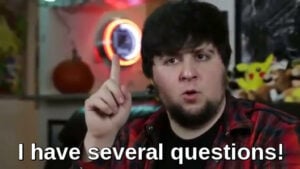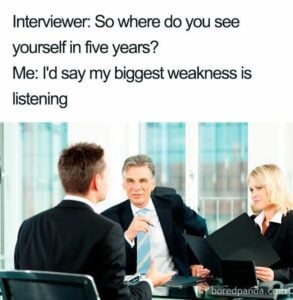
Interviews are super helpful tools for companies to identify the right candidates for the right roles—but that doesn’t mean it can’t be beneficial for the interviewee as well. A job interview is a conversation with a few unusual rules—in an unusual situation, and navigating this can be tricky. This is where job interview techniques come in.
Let’s explore why interviews are the way they are as we dive deeper into interview techniques and why they matter.
Why do we have job interviews?
We can all agree that job interviews aren’t a natural part of human existence. It’s something that we created as a useful tool—a means to an end. It’s a conversation specifically designed to gather information about someone’s qualifications or experiences, or understand their thoughts and opinions on a particular topic.
Through a job interview, the potential employer and employee get to know each other better. Interviewers can evaluate candidates, gather news and stories, conduct research, and make decisions—even identify trends. Interviews help us communicate and exchange important information in a structured and organised way, making it easier to learn about others and make informed choices.
When you attend an interview, you will be judged as an individual and a candidate for the role. Employers tend to look beyond just the information provided in resumes and application forms. This is an opportunity for them to see if you’d be a good fit for the company, culture-wise, and the team they’ll be working with. This includes assessing a candidate’s personality, communication skills, and how well they would collaborate with others.
But aside from that, it’s also sort of a test. Many job interviews include scenarios or questions that assess a candidate’s problem-solving abilities. This helps employers understand how candidates think and approach challenges relevant to the job. Additionally, interviews provide an opportunity to evaluate soft skills, like interpersonal skills, adaptability, communication, and leadership potential. These are crucial skills in most jobs but are difficult to assess solely from a resume.
What are interview techniques?
Interview techniques are valuable strategies used by both interviewers and interviewees to enhance the interview process. These techniques hold significant importance for interviewees as they directly impact the outcome of the interview and the impression they leave. Yes, job interviews entail multiple pressures. For some people, it’s an easy beast to conquer, whereas for others, it can be a challenge. To walk into a room full of strangers and convince them to hire you is a pretty hefty task—but the secret is employing an interview technique that works for you.
For interviewees, employing effective techniques can make a substantial difference in their interview experience. It begins with making a strong first impression by presenting themselves confidently and professionally. Throughout the interview, techniques for clear and articulate communication, active listening, and building rapport can create a more comfortable and productive atmosphere.
Plus, do remember, it’s a conversation—a two-way street. You can ask your recruiter questions, too!

Interviewees can also employ strategies for answering questions thoughtfully, handling challenging inquiries with poise, and asking insightful questions of their own to demonstrate genuine interest. Even after the interview, techniques come into play with follow-up gestures like thank-you notes or emails. In essence, interview techniques empower interviewees to showcase their qualifications, suitability for the job, and overall professionalism, ultimately increasing their chances of success in the competitive interview process.
How should you prepare?
There’s no one-size-fits-all approach to tackling interviews. There are hundreds of potential questions—and multiple ways to tackle them. Does this mean there’s more space for mess-ups? Yes, but if you’ve practised sufficiently with a technique you’re comfortable with, then any curveball heading your way could easily be turned around.
Carrie Nigro, Human Resource Manager at sustainable food packaging solutions provider Huhtamaki, provides some insight into its importance: “When you get ready to either start your career or you’ve been in your career and you’re ready to do something different, the best advice that I would give is that you must practise. Have someone interview you as a roleplay. Ask yourself questions and answer them.”
She adds: “I tell people all the time—you drive to work or you drive to school and you have extra time in the car, right? So, why not think about those questions that the interviewer might be asking you and answer them out loud. No one’s going to hear you, you can mess up, you can redo it, you can think about how you want to answer those questions and the more practice that you can put into it, the more authentic you’re going to sound when you’re actually in the interview.”
Carrie suggests doing some research into the company beforehand as well to help further alleviate your nervous jitters.
“When you think about what kind of position you’re going into, think about what kind of competencies that you might have or skill sets that you might have. Go on to the internet and just type in questions about specific competencies or interview questions in general.” Her advice is to look for the trending questions and use these to prepare you for the interview.
These questions come in many forms—and could be about anything. For example, it could be something like this: “You jump out of a plane with a parachute strapped to you. Mid-jump, you realise the parachute is stuck. What do you do?”
They are specifically structured to determine your thought processes, how you would handle an emergency—or how you’d solve a problem. Now, how you answer these questions is a different situation. There are methods that help you structure your responses! Here are a few.
- Behavioural: Focus on past experiences. Structure responses using the STAR method (Situation, Task, Action, Result) to highlight specific situations, actions taken, and outcomes achieved.
- Competency-based: Emphasise core competencies. Align responses with the job’s required skills, showcasing relevant experiences and achievements that directly correlate with the sought-after competencies.
- Situational: Address hypothetical scenarios. Frame answers by detailing how you’d approach challenges, using real-life examples to demonstrate similar skills and qualities.
“Base your story around a specific skill. For example, if you have a question that’s more like, ‘Tell me a time when you completed a task that you had little to no instructions on’, that’s really going to be a competency-based question and a behavioural question,” Carrie explains.
“Knowing this when the question is asked helps formulate your answer around those two things. So what skills did you use? What was the task and what was the final outcome? Really think about it kind of holistically and formulate your answer based on that.”
Balancing authenticity and preparedness
Balancing authenticity with being well-prepared in job interviews is essential for making a positive impression. In this context, being authentic means presenting your true self, while preparedness involves having the necessary knowledge and skills to perform well in the interview.
So, how can you strike that balance effectively?
Before the interview, reflect on your values, strengths, weaknesses, and career goals. This self-awareness will help you present your authentic self while being prepared to discuss your qualifications and experiences confidently. Next, understand the company’s culture, values, and mission. This research will help you align your responses with the company’s expectations and show that you’ve done your homework.
Ideally, you’d want to prepare for common interview questions and practise your responses. While doing so, aim to frame your answers in a way that highlights your genuine experiences and skills without exaggerating or fabricating information. It’s okay to pull out the occasional professional humble-brag every now and then, but just make sure it’s note a straight-up lie because that could land you in some hot water.
Using real-life examples and stories from your past experiences to illustrate your skills and qualifications works like a charm every time. This is because anecdotes make your responses more authentic and memorable.
Another issue that really impacts authenticity is your weaknesses. When discussing weaknesses or challenges, be honest. Interviewers appreciate candidates who acknowledge areas for improvement. It shows self-awareness and a willingness to grow.

Express genuine enthusiasm for the role and the company. If you’re genuinely excited about the opportunity, it will come across as authentic. Prepare thoughtful questions to ask the interviewer. This not only shows your interest in the company but also provides an opportunity for genuine conversation—and would again, further reinforce your enthusiasm.
Pay attention to the interviewer’s style and cues. Some interviewers may prefer a more formal approach, while others may appreciate a more relaxed conversation. Adapt your authenticity to the interviewer’s demeanour. Body language speaks volumes! Your tone, the way you sit, how much eye contact you make—all of these are important.
Final thoughts
Utilising a technique not only helps you be more confident in an interview but also helps you to highlight everything you need to tell them. You don’t want to miss crucial details while providing an unstructured response or an answer without a proper direction.
Try to stay calm and composed. Take a moment to gather your thoughts before responding to questions. Ultimately, remember that the interview is a two-way street. You’re assessing the company as much as they’re assessing you. Be yourself, and if the company’s culture aligns with your values and personality, it’s more likely to be a successful long-term fit. You’ve got this.



